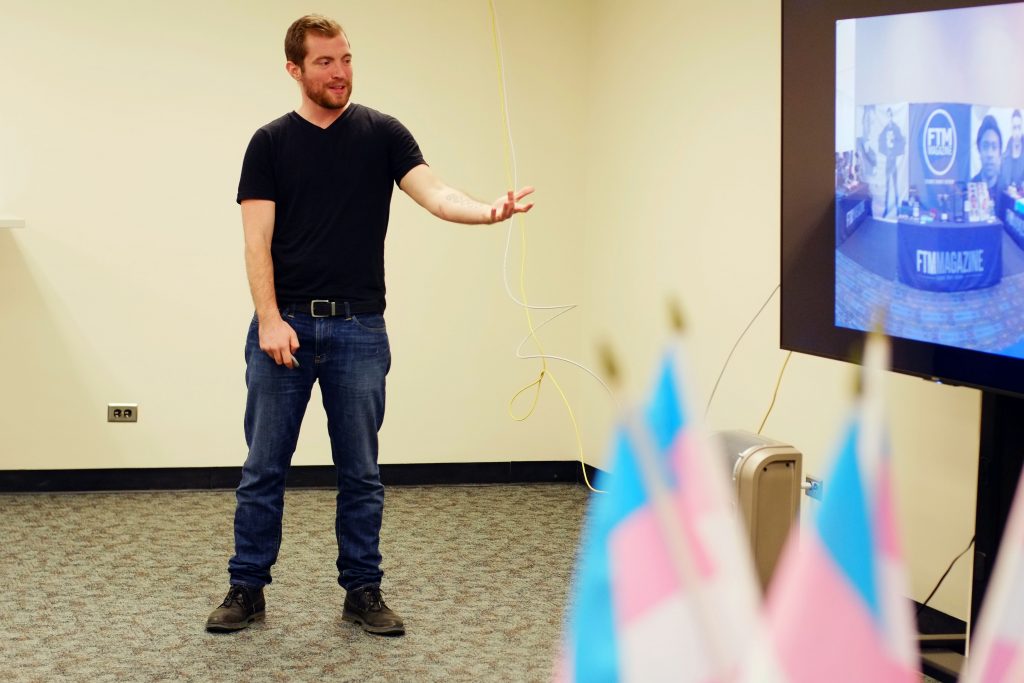
Jason Ballard’s work as co-founder and publisher of FTM Magazine has spanned many facets of the lives of binary transgender men.
From recreating Adam Levine’s iconic naked testicular cancer campaign with Aydian Dowling, a transgender male model and YouTuber, to covering the story of Logan Ireland, a transgender staff sergeant in the Air Force, Ballard has used the publication, FTM (female-to-male), to detail the stories of transgender men like himself.
He talked about his journey as a transgender man and creating his own magazine on Tuesday in the Multicultural Resource Center. The event, sponsored by the Q Center as part of Transgender Awareness Week earlier this month, allowed students and faculty to learn more about the struggles the transgender community faces and hear from Ballard, a transgender entrepreneur.
Ballard started FTM Magazine in November 2013 with co-founder and vice president Leo Reichstetter through a Kickstarter campaign. The first issue of the magazine was published in 2014 and it has continued monthly since, with a goal of promoting visibility for binary transgender men.
Winter Clark, leader of the Q Center’s Transcend program and a senior double-majoring in philosophy and the individualized major program, said they attended to hear from a transgender person who is thriving in the professional workplace.
“At least for me, one of the greatest challenges as a trans person has been … looking into career prospects and thinking, where am I going to be comfortable,” Clark said. “Events like these can kind of demonstrate, A, that it’s possible for that to happen, and B, where that can happen and how.”
A National Transgender Discrimination Survey demonstrates the real-life implications of Clark’s concerns. The survey found that 90 percent of transgender individuals experience harassment, mistreatment or discrimination in the workplace. The transgender community also has double the unemployment rate compared to the general population.
According to Kelly Clark, director of the Q Center, Ballard was invited to talk so attendees could see a successful entrepreneur in the transgender community.
“Our mission [at the Q Center] is to support the success of LGBTQ-plus students, but also faculty and staff, which many people don’t realize,” Kelly said. “We’re tasked with the entire community.”
However, this doesn’t mean that Ballard’s journey has always been successful. Ballard said the November issue of the magazine was not printed because of an unexpected deficit in funds after October’s issue.
“I’ve heard a lot of entrepreneurs go up and down, up and down,” Ballard said. “With everything, it’s always going to be hard at some points. If it was easy, everybody would do it.”
Although the magazine’s target audience is binary transgender males, Ballard understands that it doesn’t and can’t represent all niches of the transgender community.
“I know that I would be stretching myself too thin to try to represent everybody,” Ballard said. “So I’m hoping that people can come to me and talk to me and say, ‘Hey, I want to start a nonbinary magazine.’”
Other Transgender Awareness Week events included a screening of the film “Man on High Heels,” part of the Q Center’s Queer Flicks International Film Series, and a Gender-Affirming Clothing Swap, where students exchanged clothing they no longer wear for clothing that affirms their gender.
Jacob Aaronson, an undeclared freshman, said he came to the event because he wanted to find out more about the transgender community.
“I want to learn more about trans people and the trans community,” Aaronson said. “I am part of the LGBTQ community — I’m gay, but I don’t know a lot about trans culture.”


